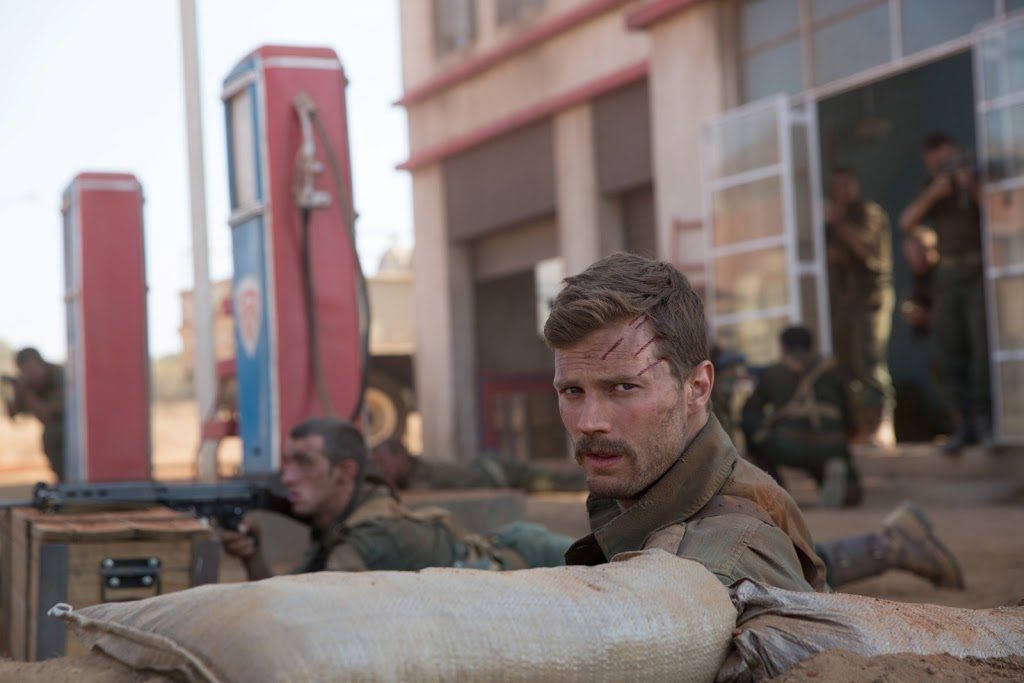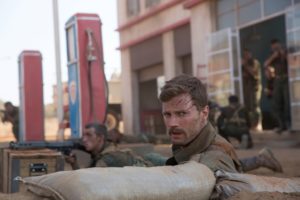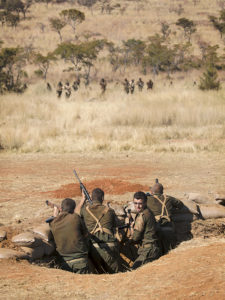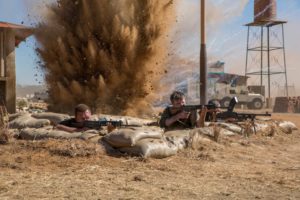Coluna Claquete – November 14th, 2016 – Movie of the Week: “The Siege of Jadotville”
Newton Ramalho
colunaclaquete@gmail.com – www.colunaclaquete.blogspot.com– @colunaclaquete
Movie of the Week: “The Siege of Jadotville”
When we talk about the misfortunes of Africa, what comes to mind is the enslavement of its inhabitants by Europeans, who led them by force to various corners of the world to a life of suffering and bondage. However, the Dark Continent’s problems are not limited to that, as the exploitation of natural resources continues today, with no benefit to the locals, causing wars with great loss of lives. A small example is shown in “The Siege of Jadotville” (2016).
In a recent review of the film “The Legend of Tarzan”, I was able to speak briefly of what was one of the most brutal colonizations in Africa, the region that received the name of the Belgian Congo, when became colony of Belgium in 1908, changing the name successive times to reach the current one, Democratic Republic of Congo.
Unfortunately, democracy is a rare commodity in the country, which has always been object of exploitation of Belgian, French, American companies, as well as guerrillas supported by United States and the former Soviet Union, always seeking the magnificent natural resources of the region, rich in gold, diamond, copper, cobalt and uranium.
The film shows a particular event of the so called “The Congo Crisis”, a turbulent period that began with independence from Belgium in 1960, and ended with the seizure of power by Joseph Mobutu in 1966.
The story begins with the military coup led by General Moise Tshombe (Danny Sapani), with the support of Belgium, United States and France, who kidnapped and executed Prime Minister Patrice Lumumba (Richard Lukunku), leader of the independence movement, and who had been democratically elected.Tshombe took power in Katanga province in the south of the country, region extremely rich in minerals, with great performance of foreign companies, financiers of the coup.
The UN Secretary-General Dag Hammarskjöld (Mikael Persbrandt), gave permission for the UN forces launch a military offensive called Operation Morthor against mercenary military units in Katanga, supporters of Tshombe.According to its mandate, the forces of United Nations Operation in the Congo (ONUC) should remain strictly impartial in the conflict.But the political leadership of Katanga believed that the UN had broken its mandate and were joining his opponent, the Congolese central government.
The scapegoat of the case was a small unit of the Irish army, at UN service, consisting of 155 men, none of them having participated in any real situation of war, not even the commander Pat Quinlan (Jamie Dornan). The group was assigned to protect the small town of Jadotville.
The group did not have the sympathy of anyone, not even the locals who believed that UN intervention could lead to the closure of mines, generating unemployment. Thus, the group was surprised by a combined attack of mercenaries, employees of mines and Congolese soldiers loyal to Tshombe.
But if lacked experience to Quinlan, there was a lot of leadership and an outstanding strategist mind.With small number of soldiers and weapons, he foresaw the possibility of an attack, building a network of defensive trenches that saved the lives of his men.
Surrounded by thousands of enemies, the Irish group resisted for six days without support from anyone, killing more than three hundred attackers, plus an unknown number of wounded.The UN group was attacked not only by land but also by planes, with no air defense resources.
The situation was not confused only on the battlefield, as there were conflicting political and economic interests, reaching culmination with the death of the own UN Secretary-General Dag Hammarskjöld in a plane crash, that even today is suspected of been an attack .
The film is very well done, with great performances from little-known actors and a well tied script with remarkable fidelity to historical facts, as well as filming on location in South Africa.
It is always good when facts like that are exposed by the cinema, to remind the general public of the horror that hangs over the continent to this day. However, it is difficult to focus on the loss of the own inhabitants of the country, as in this case in which the most important was the heroic actions of white soldiers against a large enemy force.
But the Netflix production “The Siege of Jadotville” fulfills its role as both testimony of History as well as entertainment piece, leding the viewer to identify themselves with the characters of the film. I recommend to everyone, not only watch the movie, but also researching a little about the history of this country that suffers so much.
Original title: “The Siege of Jadotville”









